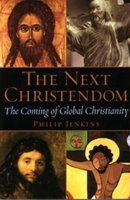
Jenkins, Philip. The Next Christendom: The Coming of Global Christianity. Oxford; New York: Oxford University Press, 2002
Book Review:There are big-picture trends that are creating a massive shift in global Christianity. While those in the West have been too myopic and inwardly focused on their own paradigm shifts, the "Global South", those countries located below the equator, has seen a resurgence of Christianity that has not been rivaled in history. Christianity is on the decline in the West, creating unique barriers and opportunities. But the explosive expansion of Christianity in Asia, Africa, and Latin America, even now not even a blip on the radar screen of the West's focus, is shaping up to be a seismic shift of enormous political, economic, social, and global impact.
What are the implications of this book for theology and religious practice? Christians in the global South will be "more committed in terms of belief and practice" (p. 94). They will be "far more conservative in terms of both beliefs and moral teaching" (p. 7). As Christianity in the West continues to decline in terms of morality, Christians in the Global South will become more conservative. This was illustrated within the last couple of years as the North American clergy in a well known denomination were rebuked (and outnumbered) by their African counterparts on the issue of gay rights. The African clergy and leadership were far more conservative in their practices than their North American peers. Christians in the global South will be "among the poorer people on the planet" (p. 7). This will have far reaching affects on the religious practice since what must be done in regards to religious practices must be accessible and simple. Christians in the global South will also "retain a very strong supernatural orientation" (p. 7), and will "preach deep personal faith and communal orthodoxy" (p. 8). The trend toward a strong supernatural orientation will continue as Christianity both clashes and mingles with the overtly supernatural religions of Africa and Asia. To us in the West, Christians in the global South will appear as "simplistic, charismatic, visionary, and apocalyptic" (p. 8).
What are the implications of this book for city ministry/urban church planting? Jenkins states that "most of the global population growth in the coming decades will be urban" (p. 93). In another major shift, these urban areas will mainly be Southern (p. 93). In fact, "the very concept of 'belonging' to a particular state will probably erode" (p. 11). As God's people we are strategically placed and uniquely positioned to deal with this trend. Urbanization is not just a trend - it is a fact. If by 2050 up to 3 of 4 people will live in cities, then the people of God must be prepared to get ahead of this trend by positioning new churches and church planting resource centers for this future growth. In the mega-cities, cities with populations of potentially more than 30 or 40 million people, there will be "next to nothing in working government services" (p. 93). This has huge implications for the church in regards to community development. Churches should be adept at the strategies and success criteria for effective community development. And the fact that millions of people will in effect be "living and working totally outside the legal economy" (p. 93) brings unbelievable risk, but also provides unbelievable opportunities for churches in regards to social justice. If churches, new and old, can be an advocate for the poor and oppressed, for compassion, for justice, they will invariably align themselves with prevailing success. Jenkins is so convinced that this is a key to growth that he goes on to state that "rich pickings await any religious groups who can meet these needs of these new urbanites" (p. 94).
In what unique ways will global church planters of the 21st Century need to be trained and equipped to be effective in Jenkins' brave new world? Because large urban areas will play such a vital role in the future of the church (p. 212), it is imperative that effective global church planters understand urban ministry, and, more definitively, how to exegete the city. They will need to be able to understand what makes a city tick, the politics, the demographics, the geographic layout of that city, why that is important and how to interpret that information. Everyone can read demographics - not many people can effectively interpret them. Effective global church planters of the 21st Century will not only need to understand theology, Bible and pastoral ministry, but will need to be adept in the area of missiology. If the "day of Southern Christianity is dawning," (p. 3) then to understand and be able to interact with other cultures is crucial, especially in urban areas where diversity and pluralism are more prevalent. And because the residents of those cities will have "next to nothing in working government services" (p. 93), it will be imperative that the churches and church leaders understand, believe in, and can appropriate a theology of the poor and oppressed. The churches of the future will need to be at the tip of the spear when it comes to social justice and advocacy for the poor, the overlooked, and the devalued. As the overwhelming needs of the communities scratch and claw at the resources of the churches, it is imperative that community development principles that seek for transformation be a tool in every church planters' tool box. And, lastly, since the clash of Islam and the West is happening now and, in more stringent ways, indicative of the future, church planters will need to be master peacemakers. They will need to navigate the treacherous waters of multi-religious city politics with grace and wisdom, always seeking to be a blessing to the city.
SUMMARY
I struggled with Jenkins very broad view of what it means to be a Christian (p. 86), and even his inclusion of Mormons as "semi-Christian" (p. 66). And at times his fawning over the Roman Catholic Church and its tradition seemed to uncover his biases. But although these were detractors, they did not take away from the force of the argument - that there is a tectonic shift of global proportions taking place right under our feet. Christianity is sweeping the world in unprecedented and unfettered ways in Asia, Africa and Latin America. As the West fades from its glory days awash in Christendom, there are new movements that can truly say that they are heralding the next Christendom, one very different from that of history, yet just as important. With unparalleled risks, yet unbelievable opportunities, this shift will define and shape the world of tomorrow.


 My
My 